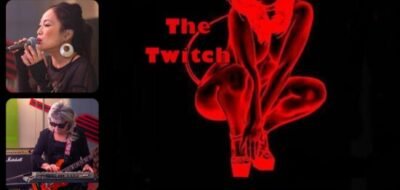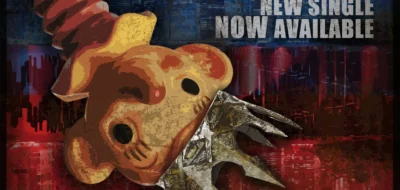As an up and coming artist it is always about growth. You have the freedom to experiment and explore your own sound. Our recent find Jack Hogan continues to expand his art with his new single “Julio Torres.”
The Los Angeles, California based singer, songwriter and multi-instrumentalist spins his music with a touch of multiple influences. When not writing songs, Jack Hogan is a legal advocate for people experiencing homelessness.
For his second official single “Julio Torres,” Jack dives into a queer folk ballad dedicated to the SNL writer and comedian of the same name. As the track opens with an acoustic guitar laying down melodies, the listener is drawn into the sitting around the campfire vibe. The vocal delivery adds to this feel. This is raw and sweet. When you dive into the lyrics though you find the humor and talent of the songwriter.
We had the chance to dive deeper into the mind of Jack Hogan and explore where his music comes from. Enjoy the interview:
First off, what is it that drives you to create music?
Trauma, more than anything. The Joker in The Killing Joke is far from a role model, but he’s tragic in the sense that tragedy itself made his world so unlivable that he made his history and reality “multiple choice.” That’s a terrible way to live for one’s self and for those around you. But I’ve worked in direct legal services for 11 years, all violent felonies, immigration, sex work, mental health, and especially homelessness. I’ve seen bodies of old women burnt up into crisps like kale chips. When you’re faced with arbitrary suffering in the world, your options are really quite limited. You can go crazy, or you can pour the crazy out. Music is the way – at least for me – to pour the crazy out so I can function like a rational human being, despite the fact doing so is pointless. It’s not the only way to make music; there are people who make music from happiness, and that are so happy they need music as an outlet to pour out their happiness. That’s great. But for me, what drives me to make music is what drives people to scream into jars and then seal them off. It’s either lyrical poetry over a rhythm, or climbing a clocktower. I make music to survive. It’s a survival mechanism. I hardly read what I wrote or listen to what I made after I fashion it into the sculpture I want. Whether I send it to a producer or send it straight to Apple Music, it’s done. That’s how I know I’m not an artist. I couldn’t care less about the end product. I just need to scream into the jar and sculpt it into something redeeming to me at that moment in time. That’s it.
How would you describe the Jack Hogan sound?
Amateurish. Unskilled. Blue Collar. Deeply rooted in the specific accent of my small rural community in backwoods Alabama. But I think those are why I have something to offer. Having to overcome a lack of education or opportunity musically, or to overcome a lack of talent especially, can really make an artist head and shoulders above the rest. Bob Dylan is a good example. I think he became the best poet and musician of the 20th century by being an average singer and guitar player. Locked into a folk setting with limited skill or opportunity, he poured over album after album and poet after poet and painting after painting and synthesized all those thousands of years of talent and accomplishment into something that – even without the voice of a meadowlark or guitar ingenuity like Hendrix or Joni Mitchell – is irresistible. His lack of advantage and serious disadvantages made him better than the rest, like a martial artist who trains to kick with weights on their legs. Or someone who has to fight with their hand tied behind their back. He has a line about his dreams being buried under tobacco leaves. I think he means it to say he lost the crooner voice he always wanted because of tobacco. I tend to think in reality that he surpassed the crooner voice he never had because things like the tobacco leaves were just weights on the arms of a boxer.
Which artists have had the biggest influence on you?
Willie Nelson. Nina Simone. Johnny Cash. Shakira. Jay-Z. Bobby Dylan. Walt Whitman. Allen Ginsberg. The trapeze family. Smokey Robinson. Charles Mingus. Herman Melville. Sappho. Caravaggio. My grandmother’s family reunion dishes. Bernini. Plato, probably more than anyone. Barbara Nussbaum. Leonard Cohen. Dolly Parton. Laurie Levenson. Kanye, as a musician more than a lyricist. Elton John. Tilda Swinton. Paul Thomas Anderson. Wes Anderson. Sarah Silverman. Dave Chappelle. Richard Pryor. And of course Kacey Musgraves. She and Sturgill Simpson really are the only musicians that come to mind that carry outlaw country and folk in a way that does the souls that came before justice. I think Cash would be proud of those two.
How does a song come together for you? What is your process?
Hahahaha do musicians have a process? Do songs come together? That sounds above my head. On a superficial level, when I have no ideas and nowhere to go, I go back to the well and pump. I listen to some of the old masters like Muddy Waters or T-Bone Walker and I try and start a conversation with them, and ask them questions. If I work the craft right, I end up with a set of themes and lyrics to start trying to update. The narrator of my music and the lyrics themselves pretty blatantly find themselves at home with the melodrama, sensuality, and sexism of the blues and old country. They’re also intimately tied up in race. So as long as I listen, ask, and learn, something always comes up when pumping the well.
But most of those songs really end up being fodder for when the moment strikes and the unexplainable happens. Not unexplainable good or anything; it’s just that the music I usually actually write down, keep, and put out is music that came from someone else somewhere else. The Greeks talked about it most precisely when they talked about the muses, and an entire family of deities is hardly precise. All of that showing up for work just becomes material for that other person or persons that takes over and has something on record for you to say “thanks” to after you listen to it for the first time. So in short, the process for me is 1) listening and writing constantly and 2) using none of it until someone else inside comes along and finds a use for it. I’ve never written any of my music is that sense. The music I write is pretty dull. The music I found written the morning after that I didn’t even know I made is the music I end up talking about like this.
Your latest single “Julio Torres” seems to be quite the ballad. What prompted a song about him?
Doesn’t it? His stand-up, if one could call it that, prompted it. Sometimes artists will express things you want to chase after yourself because they make it so confusing or enticing, if in fact those aren’t synonyms. Discussing random objects to display how he developed in his family from childhood onwards into an immigrant adult in the United States trying to navigate that series of landmines while also making room for silly observations. . . well I have never seen anything like it. That’s the kind of thing that attracts me to a guy. I have no idea who Julio Torres the person is, even though I wish him well. But it’s an earnest love letter to Julio Torres’s body of work. I’m sure I’ll make a Part Two about Los Espooky’s. His hand-acting MasterClass is probably my favorite piece of COVID lockdown work. My belief is that ballads are love songs cowboys write about men but need to distance themselves from. The Ballad of Ira Hayes really could have just been called Ira Hayes. The ballad never comes up, but Ira sure does. So writing a gay love song in the form of a ballad felt right as an iconoclast to begin with. Doing it about a stand-up comedian who sits down most of the show made it irresistible. But it’s my honest attraction to the boy that made me publish it. I mean he’s just a straight up snack. The man is fine. How else can you say it? He brought out the poem in me. Seriously, out of all the lines I’ve written referencing War and Peace or Machiavelli, or lines that rhymed in overtly academic ways that really aren’t appropriate for casual enjoyment, my favorite line I’ve ever written is a tie between “out of all the shapes I’ve ever seen, my favorite shape was you” and “please take me to New York, show me all the tallest rectangles in town/ if you show me the Empire State Building, I’ll show you something else on the way down.” It’s dumb and juvenile to the extreme, and is the most superficial way to reference his special “My Favorite Shapes.” I don’t know who wrote those lines. But I straight up cackled listening to them while writing this. So why did I write him a love song? 1) the off chance of a nice dinner with someone interesting and 2) what was written down made me laugh harder and shake my head in judgement than the other material. That’s when I know I nailed the narrator. I see Jack Hogan to be in this stage of the character.
This seems like a shift from your earlier music. Is this a new direction or just an experiment?
Ah, this is where I tip my hand and show the cards. Electronic music made with bass synths and beat machines is pretty indistinguishable from roots blues, Motown, soul, or funk. Half the time, it’s a classic in those genres that is being sampled as the underlying track in the first place. So if you’re a country guitarist who knows E, A, and B7 and can hit a button on cue, you’ve got everything you need to make a electronic music song or something resembling hiphop. Don’t let me appear too humble; knowing what to do with those tools requires alot of pain, alot of sex, and years upon years of soaking up those musical patterns beyond the Old South where American music was made. If you don’t know 808’s and Heartbreak front to back, or have a working knowledge of A Tribe Called Quest, working a Maschine is not going to come naturally to a roots musician. But as long as listening, asking questions, and listening again occurs, the genres are really one long musical evolutionary chain from the Great Migration to Chess Records to Motown to James Brown to Funkadelic/Parliament to Grand Master Flash and so on, until you get to J. Cole coming full circle with the album Troubadour. It’s hard to fictionally write so grand and coherent a narrative as American musical life offers by virtue of its own organic makeup.
Share some advice for other artists creating unique sounds?
1) Stop making sense. It’s really unhelpful in music. Listen to Subterranean Homesick Blues or Yeezus and just question how much making sense really helps.
2) Spend at least one day a week not being afraid to suck. I think that comes from Steven Tyler of Aerosmith by way of some marketing executive who shared a flight with him. But Aerosmith would spend one rehearsal day a week pitching only the dumbest and worst ideas they came up with. Great stuff came from that. If there is only a 1/100 success rate, and you do it once a week, you’ll have a genius hit from your worst garbage once every two years. That’s fantastic when you consider how many artists live next to me on the Westside off of just one song.
3) Psychotherapy. People who pursue music full time almost invariably are too broken themselves or while in a fractured reality to do anything but make music. But basic mental health required to tour aside, the introspection psychotherapy can bring can really be the key to projecting yourself onto the world, or projecting the world into yourself, in idiosyncratic and interesting ways. Know thyself, in short. But doing that alone, counterintuitively, isn’t the best or only way.
4) Plug-Ins. Want a sound no one’s used before? Go past the D’s in a Universal Audio or Native Instruments plug-in bank. Seriously. Coders get paid for a reason. Software you aren’t using are sounds you aren’t aware of or allowed to use.
What is next in the career of Jack Hogan?
Career? I’m not really sure what that means. I’m not really sure whatever it meant applies to my generation at all, were it to mean something. And I’m in an odd place, because I don’t make music for a career, or for someone else, or for myself. I just record what comes out. Just recently I’ve decided to open up my back catalogues and put out outtakes and little gems I found that struck my interest. But there isn’t a plan or a goal. I just make the music I’m given, from wherever it comes from, and ask as few questions as possible. My hope for my career then, if it can be called that, is to pay sufficiently little attention to anything going on to permit me to keep throwing up music without knowing how. The minute I try to know how, the music will either end, or be understandable to me and be less interesting. I guess that makes the non-career career goal on my horizon to make a song that makes so little sense to me and so much sense to someone else that someone else can genuinely explain my own song to me in a way where I can understand that song for the first time. I’ve been getting attempts, but I haven’t been satisfied yet. I want to be.
Thank you Jack. We will be keeping an eye and an ear out for more soon.








